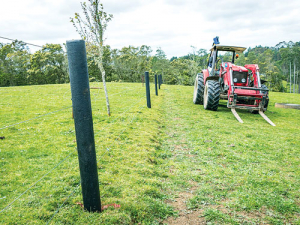On Your Behalf: Health and Safety Checklist for Vineyards and Wineries
Keeping healthy and safe during vintage 2026
 An agricultural fencing sole trader has been sentenced after failing to ensure one of his employees wore correct protective gear.
An agricultural fencing sole trader has been sentenced after failing to ensure one of his employees wore correct protective gear.
A Kaikoura employer who didn’t provide appropriate eye protection has been sentenced for failings that cost a young worker his vision in one eye.
Daniel Anderson, an agricultural fencing sole trader, had a 17-year-old worker who was chiselling when a piece of metal flew into his right eye in March 2020. Despite multiple surgeries, the teenager lost sight in the eye.
Anderson did not notify WorkSafe of the injury, as required by the Health and Safety at Work Act 2015. Several months later the victim’s mother did so, triggering an investigation.
When a WorkSafe inspector asked Anderson whether he told workers to use protective gear, his response was “I’m not their mother and going to dress them every morning”.
Anderson confirmed he had not provided full instruction to the victim on the use of personal protective equipment (PPE), such as safety glasses, because in his words “it was common sense”.
Anderson also indicated to WorkSafe he felt it was too expensive to buy PPE, saying “I’m too small for that sort of… carry on”.
Anderson was sentenced at Kaikoura District Court on 15 July.
Judge Raoul Neave ordered $22,500 be paid for emotional harm and consequential loss, given Anderson’s lack of insurance and inability to pay a fine.
WorkSafe’s national manager of investigations, Hayden Mander says the employer’s comments reflect an outdated, unacceptable, and cavalier attitude.
“A young man at the start of his working life now has seriously impaired vision. It’s astounding for an employer to not understand the seriousness of the situation,” says Mander.
“The cost of health and safety is part of the cost of doing business. The worker should have been provided with appropriate PPE, including eye protection, and required to wear it when using a chisel and hammer or any other task where there is a risk of an eye injury.”
Workers who are vulnerable because of age, inexperience, or conditions of employment may be less likely to question health and safety practices of to speak up if they are unsure.
“Beyond the obvious health and safety gaps in this case, it’s both illegal and morally wrong for an employer of any size to not notify WorkSafe of an incident like this. No employer is exempt,” says Mander.
The Meat Industry Association of New Zealand (MIA) today announced that Chief Executive Officer Sirma Karapeeva has resigned from the role.
The winners of the 2026 Hawke’s Bay/Wairarapa Dairy Industry Awards were announced at the annual awards dinner held at Copthorne Solway Park in Masterton on Thursday evening.
Environment Southland is welcoming this week’s decision by the Environmental Protection Authority (EPA) to approve the release of Blaptea elguetai, a leaf‑feeding beetle that will help control the highly invasive Chilean flame creeper.
This March, the potato industry is proudly celebrating International Women’s Day on 8 March alongside the International Year of the Woman Farmer, recognising the vital role women play across every part of the sector — from paddocks and packhouses to research, leadership, and innovation.
Fruit trader Seeka posted a record profit and returns to shareholders in 2025.
Recent weather events in the Bay of Plenty, Gisborne/Tairawhiti, and Canterbury have been declared a medium-scale adverse event.

OPINION: A mate of yours truly reckons rural Manawatu families are the latest to suffer under what he calls the…
OPINION: If old Winston Peters thinks building trade relations with new nations, such as India, isn't a necessary investment in…